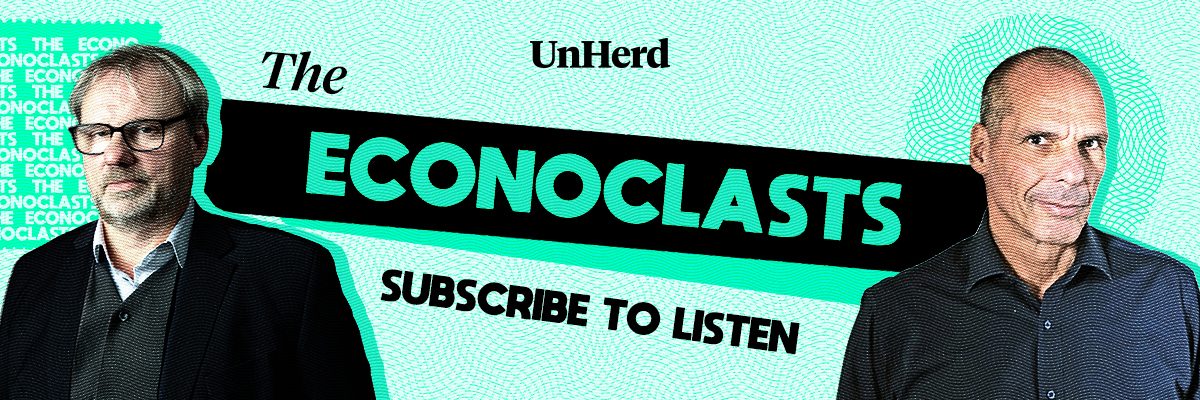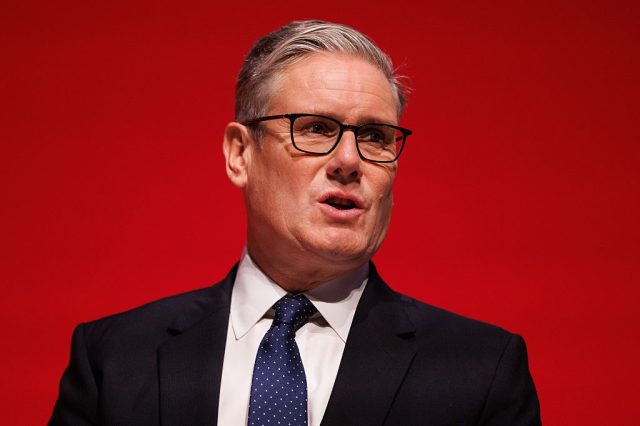‘I say: the door is open, and you can leave.’ Dan Kitwood/Getty Images

In February 2023, the Equalities and Human Rights Commission confirmed it was satisfied with the Labour Party’s rooting-out of antisemitism. The purge of the Corbynites was complete. Announcing at a podium that Labour, under his leadership, had changed for good, Starmer turned his gaze directly to the camera. “If you don’t like the changes that we’ve made,” he told disgruntled party members, “I say: the door is open, and you can leave.”
Starmer wasn’t the only member of Labour’s front bench to cheer on a declining membership. In an interview six months earlier, Rachel Reeves actively welcomed the loss of certain supporters. “Membership in my constituency is falling and that’s a good thing,” the Leeds MP told the Financial Times. Those who were leaving the party, said Reeves, “never shared our values”.
Today, less than 18 months after Labour’s general election triumph, those statements already feel like relics of a bygone era. Labour is failing to balance its books this year, and is battling to properly resource next May’s local council elections. On Tuesday, UnHerd asked the party whether Reform now has a larger membership. The party’s press office referred to the figure of 333,235 that was published at the end of 2024. That figure was reported in February to have dropped to 309,000. By now, it is highly likely that Reform’s surging membership, at a self-reported 265,000 or so, has either overtaken Labour’s or will do so imminently.
As Labour’s membership and funding contract, so is its wider support — to a more severe extent than senior politicians are publicly acknowledging. Last week’s Senedd election in Caerphilly, a constituency which has voted for a Labour MP every time since 1918, was won by Plaid Cymru. The Labour candidate, thumped by Reform, didn’t even come second. Wes Streeting, the Health Secretary, compared that defeat to the Hartlepool by-election in 2021, where the Tories snatched what had for generations been a Labour stronghold, declaring it “rock bottom”. But such a comparison is wholly inadequate. After all, in 2019 Labour retained Hartlepool only because the Leave vote was split between the Brexit Party and the Tories. The south of Wales is a whole other matter.

What is more, coming back from what just happened in the Valleys is immeasurably harder. In that Hartlepool defeat, Labour finished second. Last week, by contrast, they gained just 11% of the vote. There’s much to suggest that the fate of Welsh Labour at the next general election could resemble that of its Scottish sister party in 2015. Wipeout.
It is always easy for political journalists to become breathless about events such as these. The attention economy constantly demands new twists and turns in public life: a perpetual churn of new figureheads and takes. But to underscore quite how bizarre British politics has become, consider this. Not only might Reform have more members than Labour, and not only are Welsh nationalists winning in places Labour have held since universal male suffrage, but there are now national polls putting the Green Party on a higher share of the vote than a Labour government — one that commands a larger majority than Margaret Thatcher ever enjoyed.
For now it is just one pollster, FindOutNow, that has Zack Polanski’s party in third. But that reflects a wider shift in the party’s performance in the seven weeks since he was elected leader. On Monday, a poll by Lord Ashcroft had the Greens on 17%, a solitary point behind both Labour and the Tories. YouGov, often viewed as the gold standard in British polling, now has the party on 16%, with Labour’s 17% its worst on record. According to that same poll, the Greens now lead Labour, and Reform, among those under 50. Among the young, specifically those aged 18 to 24, the Greens now have almost twice Labour’s vote share. Votes at 16 may ultimately harm Starmer’s re-election efforts more than it helps them.
These are not figures that befit a party in government. But Keir Starmer’s view of power has long been that only one of two parties matter in British politics. As long as the Tories were neutralised, the thinking went, he would remain in Number 10. But in less than two years, that logic has shattered. Labour are threatened not only to their right by Reform, particularly on issues like immigration and law and order, but to their left as well. Since Polanski won the leadership, the Green Party’s membership has doubled: it now stands at more than 150,000, and has even surpassed the Tories. There is a non-trivial chance that, before next May’s local elections, Britain’s two largest parties will be Reform and the Greens. For all the naysaying of pundits in London, who often argue for an inverse correlation between electoral success and membership size, the membership surges matter. More members doesn’t just mean more activists, but more direct debits too. Money is critical if you want to seriously contest Westminster politics.
Besides members, and money, Reform and the Greens are also led by two of the most effective politicians in England. Both Farage and Polanski excel in the modern media environment, where chat shows matter as much as political interviews, and vertical social video draws more eyeballs than any appearance on Newsnight. One of Polanski’s videos, with the title “Let’s Make Hope Normal Again”, has been viewed almost 12 million times on X.
The two men might agree on little regarding policy, but in one key respect they are similar. Both, according to the thinking of political scientist Paolo Gerbaudo, are “hyperleaders” — more similar to President Trump and Alexandria Ocasio-Cortez than Kemi Badenoch or Keir Starmer. Hyperleaders enjoy strong personal recognition, which arguably supersedes that of their parties. They leverage unmediated digital relationships, speaking directly to their audience: Farage has GB News, Polanski a podcast. Both present themselves as authentic outsiders to the political class. And despite the superficiality of digital media, both have real substance on matters of policy. You know what Farage thinks about immigration, or Polanski on taxing the super-rich. But what are Badenoch’s or Starmer’s views? As much as anything else, the hyper-leadership of both Farage and Polanski serves to make the leaders of the Big Two appear almost insincere. Both Labour and the Conservatives increasingly look like Diet Coke versions of everything they claim to be. The real problem for Starmer is that Polanski is saying many of the things he himself asserted while in opposition, whether it’s on the virtues of industrial action or the case for public ownership. It’s just that Polanski seems to mean it.
For all the talk of a grim Budget in November, next May will be the deciding moment for Starmer’s premiership. Besides a likely drubbing in both Wales and Scotland, all of London’s 32 boroughs will choose councillors. It’s increasingly plausible that Polanski’s party won’t just pick up wards in the capital, something which is now close to certain, but become the largest party in one or more councils. It will be in those authorities where the Greens perform best — most likely Hackney, Lambeth and Southwark — that they will subsequently select as leading targets for the next general election.
But even if May is an unprecedented nadir for Starmer, it could be just the beginning of the party’s woes as growing success for electoral rivals, Left and Right, leads to a wave of defections at a local level. Ideological alignment is part of that, certainly, but in many cases they will simply stand a better chance of re-election if they jump ship. Others could face the choice of defecting to the Greens, or being blocked from re-selection if they are too critical of the Starmer leadership. (This happens every year, under a range of pretexts.) That cascades upwards too: would Clive Lewis, Olivia Blake or John McDonnell rather join the Greens or be blocked from standing again? For a post-ideological politician like Starmer, what keeps the show on the road is the adhesive of power. Take that away, and the wheels come off.
Confronted with electoral doom-mongering, Labour supporters are now arguing that the wipeout in Caerphilly was a result of tactical voting designed to keep out Reform. To an extent that is true: Green and Liberal Democrat voters flocked to Plaid Cymru’s Lindsay Whittle last week, with both parties losing their deposit. What is more, that is precisely what happened in elections to the French legislature last year. Despite coming first in the popular vote in the first round, the National Rally ultimately finished third. Senior people in Reform are savvy enough to know something similar might await them. Even Tom Watson, Labour’s former deputy leader, recently declared that the country is heading for a “Stop Farage” election. Stop Corbyn, stop Brexit — and now stop Reform. It begs a question: what is the Labour Right, of which Watson is a standard-bearer, actually for?
More importantly for the party, though, is that leaning into a progressive alliance, and hoisting a banner proclaiming “stop Farage”, may actually accelerate Labour’s demise. That narrative might work if you are the leading progressive force. And yet for Labour in Wales, and Scotland, that appears to no longer be the case. London, and other parts of England, might not be far behind — especially after next May. It’s a dangerous game for Starmer’s party, played on fine margins. Get it right and you remain in power. Get it wrong, and you kill the idea that Labour is the default choice for progressive voters. Labour’s willingness to jettison members might soon look like naïvety.
It may be a platitude among Labour circles, but it is nevertheless true: Labour only wins as a broad coalition. That was the case with Clement Attlee, Harold Wilson and Tony Blair — a man who even came to an accommodation with Ken Livingstone as the Mayor of London. Starmer, who, uniquely as leader, wanted a smaller party, appears incapable of such sagacity. In Britain, general trends at a global level, of centre-left parties fragmenting and failing to adapt, have now converged with the particular: a small-minded man incapable of building alliances.










Join the discussion
Join like minded readers that support our journalism by becoming a paid subscriber
To join the discussion in the comments, become a paid subscriber.
Join like minded readers that support our journalism, read unlimited articles and enjoy other subscriber-only benefits.
Subscribe